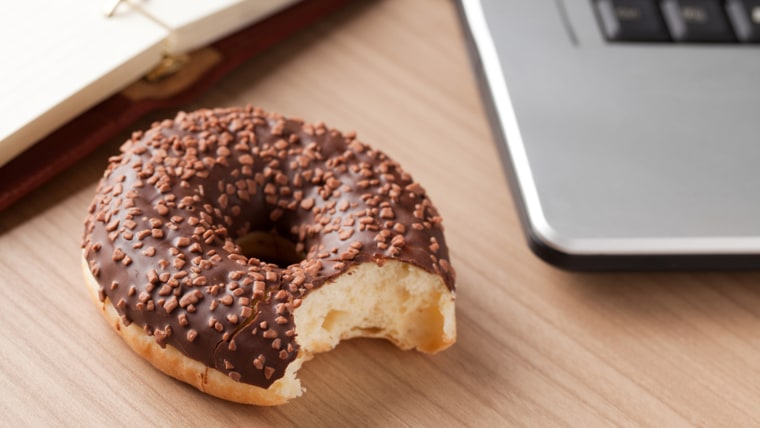Whenever I have to finish a big project, I follow the same routine: Get stressed out, check every portal on the Internet that might have something interesting to read but has nothing to do with what I’m working on, scroll all social networks possible, and then eventually hunker down and stare at my computer.
Then, I immediately get up and eat a snack.
I’ve inhaled bowls of grapes, containers of blueberries, tubes of string cheese, frozen GoGurts, half a bag of Ruffles potato chips, an entire package of double-stuffed Oreos, the ends of various pints of ice cream, pretzels and endless cups of coffee, all in the name of stalling for just a few more minutes before I really have to get down to business.
“Oh, yeah — procrastineating,” a friend said, when I mentioned this habit.
Procrastineating! Yes! As I was relieved to find out, I’m not the only one who uses food as a delaying tactic — it even has its very own Urban Dictionary entry, which defines “ProcrastinEating” as “The consumption of food undertaken to avoid a dull or arduous task, irrespective of hunger levels or the time of day.” Usage: “Mark: Man, this history paper's taking me forever...I could go for some guacamole and spicy salsa dip on crackers... ” John: “Dude, you ate lunch half an hour ago. Quit ProcrastinEating and get back into it!”
Relax, John. Maybe Mark needs that guacamole to focus!

While it’s not yet in the regular dictionary, experts say procrastineating is a real phenomenon.
“One of people's favorite ways to procrastinate is by snacking — I hear about this all the time,” said Dr. Drew Ramsey, assistant clinical professor of psychiatry at Columbia and the author of "The Happiness Diet."
“Oftentimes, when we're facing a deadline, there's kind of an unpleasant anxiety that comes with that. The anxiety is good because it helps us get things done, but the brain often looks for a short-term fix for anxiety, and certainly food and pleasurable food — which is often what snacks are, a sugary, salty fatty tastiness — that's a very pleasurable signal for the brain.”
At work, I have a front row seat to everyone’s procrastineating habits, as my desk is conveniently located by— or rather, attached to — the free food counter. This means that day after day, heaps of snacks are deposited less than a foot from my face: doughnut holes, cookies, bags of Doritos in new and untested flavors, leftover food from photo shoots, you name it. What's surprised me, however, is the utter lack of enthusiasm that accompanies most of our daily procrastineating. "I don't even want this," most people say, as they scarf down free chocolate. "Why am I eating this?"
TODAY health and nutrition editor Madelyn Fernstrom said she’s heard from many patients who report this behavior.
“For many people, it’s a type of stress eating," Fernstrom said. "People want to delay work, then feel guilty or stressed about it — like, ‘I really better get to work!’ They often eat as a response to stress (“I should be working”). It can be a vicious cycle — and lead to chronic overeating.”
But both Fernstrom and Ramsey say the instinct to take a snack break can actually be a good one — if you choose your food wisely.
“I think it does serve a purpose,” Ramsey said. “When we want to increase cognitive capacity and mood, there are only a few ways to do that, and one of them is by eating simple carbs and sugar — there's an immediate boost in cognition that happens. Mood and focus go up, at least in the very short term.”
To make the most of your snack, he recommends avoiding empty calories and instead munching on dark chocolate, a handful of nuts, an apple, or sipping green or herbal teas. “Instead of having procrastineating hijack somebody, there's a way to use that desire as an opportunity to enhance brain function.”
He also recommends keeping a healthy option in your desk, which lets you get the benefits of a quick snack without losing momentum. “Snacking often leads to chatting and then 30 minutes go by,” he said. “I would rather people spend 10 to 15 minutes focusing on getting their brain back in a way that enhances productivity and creativity so they can go on home and have a delicious dinner.”
If you really want to stop procrastineating, Fernstrom said the first step is to admit you have a problem. ("I'm Meena, and I'm a procrastineater.") Then, create a schedule — including snack breaks! — and stick to it, avoiding grazing in between.
“It’s hard at first, but you can unlearn this behavior,” she said. “It gets easier after a week or so, and then it’s a habit by the end of three to four weeks.”
Editor's note: This is where the story ends. Meena went to grab a snack.